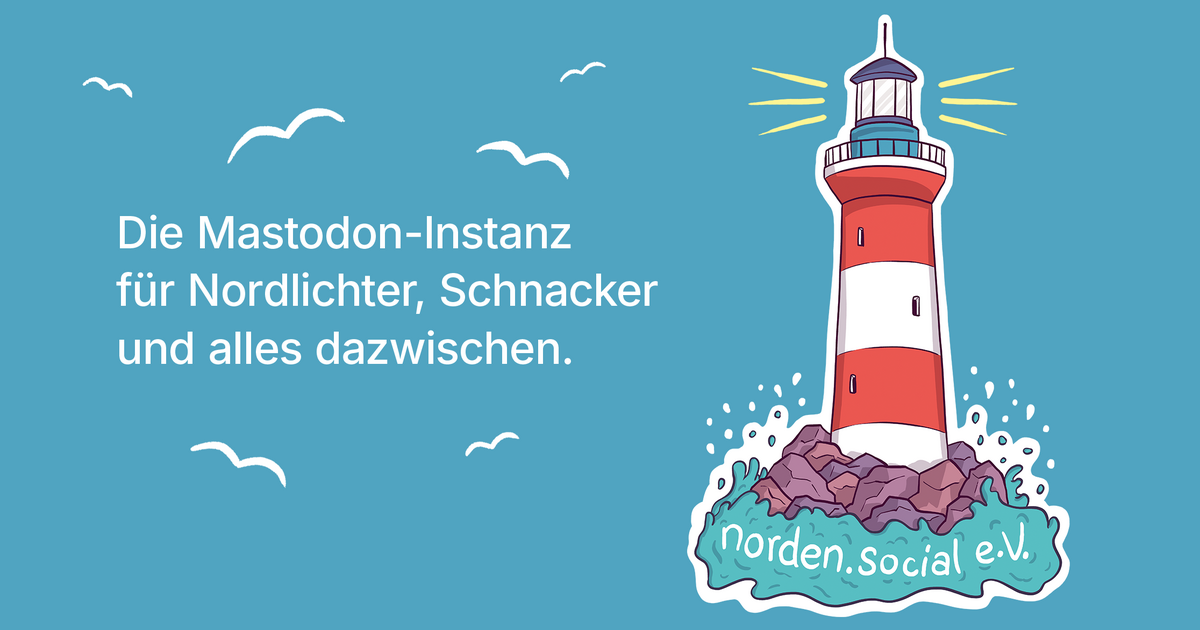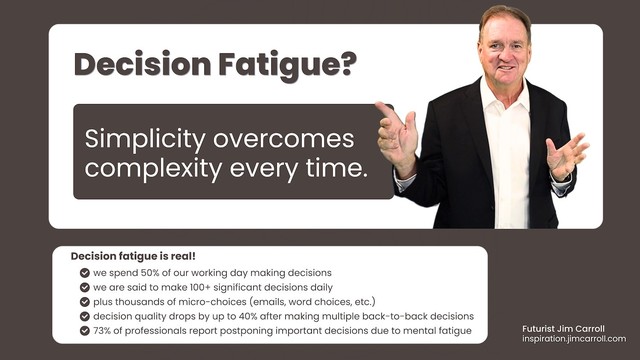Recent searches
Search options
#simplicity
Micro-Scrum, by @j9t [@frontenddogma.com]:

"Decision fatigue? Simplicity overcomes complexity every time" - Futurist Jim Carroll
A shoutout to Christa Haberstock for giving me the idea!
----
Each month, I do an email blast to the various speaker bureau folks who have booked me through the years - about 260 people at this point,.
With that being the case, I've come to keep my message - a key way of keeping them up to date - shorter and to the point..
Here's what I sent yesterday. It speaks for itself with powerful guidance that can apply to just about anything.
---
Decision fatigue is real. Breaking through is what matters!
Let's talk about why clients can't make up their minds in 2025!
Noticed clients taking forever to pick speakers lately? It's not you - it's decision fatigue!
I remember seeing a post somewhere on LinkedIn recently that something like 1.5 million people have either 'speaker' or 'keynote speaker' in their profile - no wonder clients are feeling overwhelmed.
This is making it difficult for them to select a speaker - and this is combined with the decision fatigue they are already facing.
Decision Fatigue? What's that?
In my 30+ years of speaking about leadership and innovation, I've often shared insights with audiences about the issues people have with making decisions. Here's what I know - simply put, our brains get tired after making too many choices. Each decision uses mental energy, and eventually, we run out of gas. When we run out of gas, we do the easiest thing possible - we stop making decisions.
Recent studies highlight just how real this problem is:
One study suggests we spend 50% of our working day making decisions
- We make 100+ significant decisions daily, plus thousands of micro-choices (emails, word choices, etc.)
- Decision quality drops by up to 40% after making multiple back-to-back decisions
- 73% of professionals report postponing important decisions due to mental fatigue
I've also noticed that decision paralysis becomes significantly worse during periods of volatility.
Back in 2002, I identified what was happening in the meetings and events industry as what I called "aggressive indecision" - people simply refusing to commit to anything due to overwhelming uncertainty.
I think that's where we are at right now.
By the time they're looking at your speaker options, they've already made too many decisions that day. Their brain is basically saying, "Not another choice!"
No wonder they ghost you after initially seeming excited!
They make the decision easy by deferring it, avoiding it, and not thinking about it.
Here's how to make it easier for mentally drained clients - make it easy for them to make decisions.
#Decision #Fatigue #Simplicity #Choices #Focus #Clarity #Overwhelm #Efficiency #Leadership #Action
The original #LISP had 7 primitives: \(\texttt{cons}\), \(\texttt{car,}\) \(\texttt{cdr}\), \(\texttt{atom}\), \(\texttt{quote}\), \(\texttt{eq}\), and \(\texttt{cond}\). And the original #Smalltalk syntax could fit on a 5×7 card. That meant a novice could learn the syntax in a matter of minutes, and direct all his efforts to learning how properly to wield the power of that Turing-complete language. This was why, in the 1970s and the 1980s, many college freshmen were taught FP in Scheme (a more modern LISP) and many middle school children were taught OO in Smalltalk. These were surely the best "first" #programming languages.
#FORTRAN and #BASIC were simple, too. FORTRAN, the first high-level language, has been in continuous use since the late 1950s by engineers, who are not keyboard warriors. BASIC was invented in the early 1960s for teaching programming to non-STEM students at Dartmouth. It sired a whole generation of self-taught children in the 1980s.
Compare those to C++, Erlang, Python, Haskell, Java, JavaScript, Scala, Rust, Kotlin, and pretty much every language in popular use today. Most consider Python and JavaScript to be the simplest of modern languages. Yet, they are massive, complex languages. No 10-year-old could teach himself those, nor should he.
The original versions of those classic languages cannot be used to solve modern problems. But they should still be taught to youngsters as their first language. Throwing in the kids' faces a modern enterprise language confuses them and discourages them. Consequently, many novices never attain that state of flow, when the joy of programming gushes forth.
#Simplicity is a virtue. Self-motivated learning is virtuous.
#Design #Challenges
Simplification takes courage · “Simplicity isn’t the absence of complexity, but rather complexity resolved.” https://ilo.im/162y5c
_____
#Decisions #Clarity #Simplicity #Complexity #ProductDesign #UxDesign #UiDesign #WebDesign
Seek simplicity, and distrust it.
-- Alfred North Whitehead
#Wisdom #Quotes #AlfredNorthWhitehead #Simplicity
#Photography #Panorama #TheMaze #Dollhouse #Canyonlands #Utah
I like all #programming languages. I like even more those languages that an experienced #programmer could learn in a few hours, like #Elm, #TypeScript, #Gleam, and a few other similar ones.
I am not claiming that these languages will make all jaded programmers happy, for each has its own set of pluses and minuses. I am simply pointing out that "unquantifiable something" in their design that makes these languages easier to take up.
That "something" could well be #simplicity. The designers of these little languages seem to be more concerned with making the language users' lives easier through simplicity, instead of with impressing other language designers through complexity. This is also the same philosophy behind FORTRAN, LISP, C, and Smalltalk. And I would add ML, MATLAB, and Go to this list, too.
Perky Sue
Johns Canyon Road, UT
Stumbled across this older photo and found it very pleasing to my eye. I hope you find it so, as well.
Oh, look! Yet another *groundbreaking* tool promising to revolutionize project management for freelancers!
Because, you know, nothing says "simplicity" quite like cramming #Agile, #Scrum, and *unlimited collaboration* into one platform.
https://enkitask.com/ #groundbreaking #projectmanagement #freelancers #simplicity #collaboration #HackerNews #ngated
Great Software Design Looks Underwhelming, by @sjgoedecke@x.com:
#SimpleSaturday or #SilhouetteSatuday ?
Continuing my theme of hashtags that nobody has ever heard of
#Simplicity beats #complexity ...
In the light of #evolution, everything suddenly #makes #sense
In the interplay of #modeling, #feeling and the #evolutionary principles we decode the #secrets of #knowledge and #understanding. In doing so, we come across #consciousness, #mind and #intelligence.
Ready to rediscover evolution?
https://modfeelblog.wordpress.com
#Nature plays #Lego, not #mathematics
Evolution rewards #simplicity, not #perfection.
How does that work?
https://modfeelblog.wordpress.com
This is one reason why I ignore mission statements when I make decisions.
In beta: Simplicity by (the) Dave Thomas. 33 ways to simplify sw dev.
details:
https://medium.com/pragmatic-programmers/simplicity-312763f9da54
#Simplicity beats #complexity ...
In the light of #evolution, everything suddenly #makes #sense
In the interplay of #modeling, #feeling and the #evolutionary principles we decode the #secrets of #knowledge and #understanding. In doing so, we come across #consciousness, #mind and #intelligence.
Ready to rediscover evolution?
https://modfeelblog.wordpress.com













